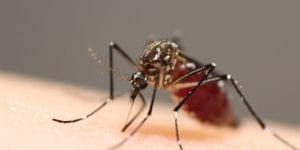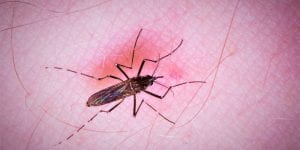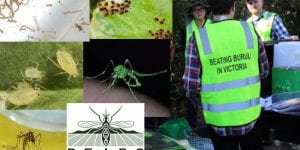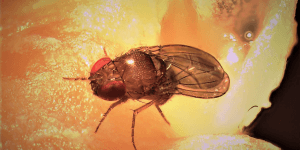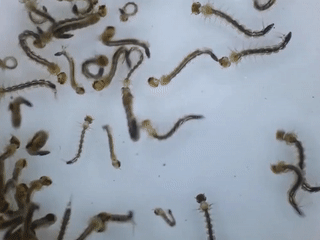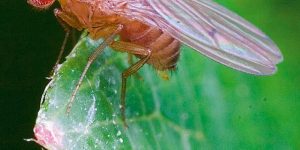Tag: wolbachia
-
Releases of Wolbachia-infected mosquitoes for disease control
Words and images: Perran Ross When animals raised in captivity are released back into the wild, you might picture cute and furry mammals from an endangered species. But in many countries around the world, people are releasing mosquitoes raised in laboratories into the environment. These mosquitoes feed on human blood and are vectors of dengue, […]blogs.unimelb.edu.au/pearg/2019/09/18/releases-of-wolbachia-infected-mosquitoes-for-disease-control
-
Using bacteria to control mosquitoes Dr Tom Schmidt and Professor Ary Hoffmann “This article was first published on Pursuit. Read the original article.” Living inside the cells of insects is a type of bacteria that is looking increasingly like the key to controlling the spread of dengue fever, the Zika virus and other mosquito-borne diseases. […]
-
MSc projects 2020 – Students wanted
We are seeking motivated MSc students to apply for several projects starting next year. Enquiries via pearg-queries@unimelb.edu.au Project 1/4: Exploring bacterial symbionts for agricultural pest control PEARG is researching ways to control important agricultural pests such as aphids and mites that cause millions of dollars in damage to crops each year in Australia. This project […]blogs.unimelb.edu.au/pearg/2019/06/14/msc-projects-2020-students-wanted
-
Sterile mosquito release leads to 80% population knock-down in Singapore
The National Environment Agency of Singapore released Wolbachia infected male mosquitoes last April in order to suppress the local population. The field study has been a fantastic success with an 80% population reduction achieved in the last nine months. Ary is a member of Singapore’s Dengue Expert Advisory Programme, providing expertise and guidance for the […] -
Marking mosquitoes
Words: Mengjia Liu Images: Perran Ross and Mengjia Liu It is important to study the fitness of different colonies of Wolbachia-infected mosquitoes, and also of interest to test fitness effects within the same colony when mosquitoes are maintained under different conditions. As we have been maintaining uninfected mosquitoes under laboratory conditions for over 25 generations, […] -
A new and unusual Wolbachia bacteria from Drosophila flies limited to the female sex
Words: Ary Hoffmann Cover image: Perran Ross As Wolbachia bacteria that live inside insect cells continue to be discovered and studied in detail, our appreciation of the diverse ways in which these bacteria interact with their hosts continues to expand. In past work we have found Wolbachia that cause embryo death when infected males mate […] -
Probing the void for blood
Words and video: Perran Ross I recently filmed one of our mosquito colonies trying desperately to reach my arm through their enclosure. The video has been posted on Reddit by a third party and received enormous attention with over 4.5 million views in its first nine hours. To make the video, I held my arm […]blogs.unimelb.edu.au/pearg/2018/07/10/probing-the-void-for-blood
-
New publication | Fine-scale landscape genomics helps explain the slow spatial spread of Wolbachia through the Aedes aegypti population in Cairns, Australia
Author summary and figures by Tom Schmidt Wolbachia is a bacterium that suppresses the capacity for arbovirus transmission in the mosquito Aedes aegypti, and can spread spatially through wild mosquito populations following local introductions. Recent introductions in Cairns, Australia have successfully established Wolbachia in the Ae. aegypti population, but the infection has spread more slowly than expected […] -
Collecting fresh mosquitoes | PEARG in the field
Words: Tom Schmidt Photos: Tom Schmidt and Perran Ross At PEARG, we have a great interest in environmental pests and how to deal with them. One of these pests is the mosquito Aedes aegypti, which causes catastrophic damage throughout the world’s tropical zone. Aedes aegypti spreads viruses such as dengue, Zika and chikungunya, and is […]blogs.unimelb.edu.au/pearg/2018/04/30/collecting-fresh-mosquitoes-pearg-in-the-field
-
The Wolbachia pandemic | Symbionts spread rapidly across highly diverged flies
Words: Perran Ross Cover photo: Andrew Weeks Wolbachia are perhaps the most prevalent bacterial symbionts on earth. Of the millions of insect species, Wolbachia are estimated to infect up to half of them. These bacteria are renowned for the effects they exert on their hosts, which can often be quite dramatic. Some Wolbachia strains are […]
Number of posts found: 24
